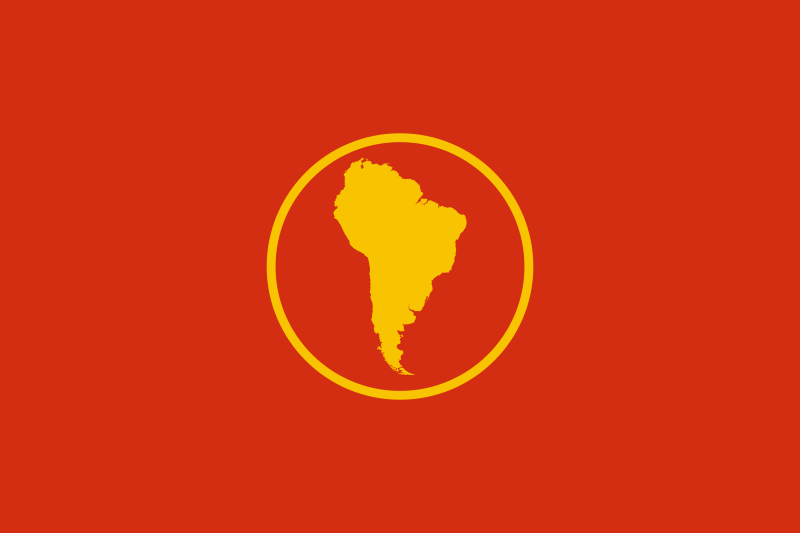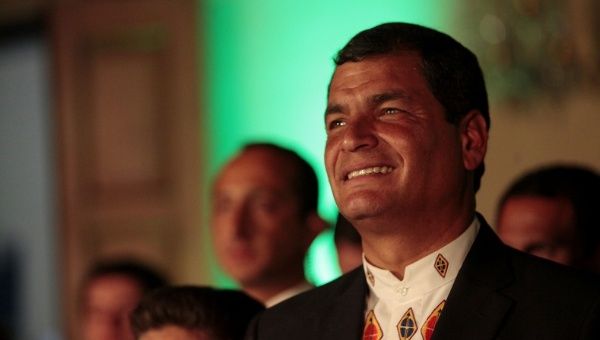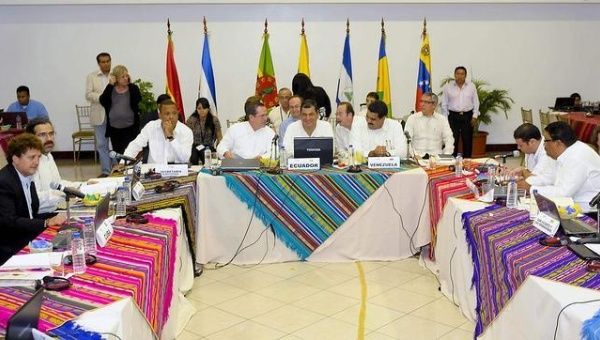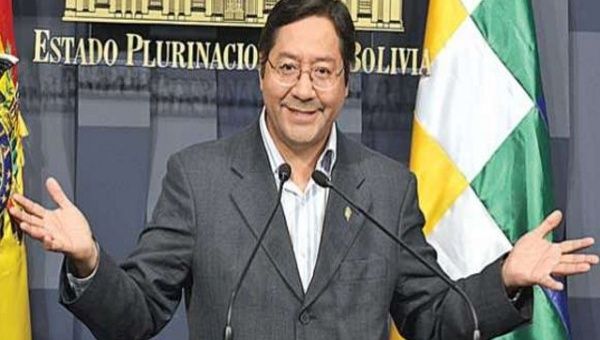
Este é um espaço fundamentalmente dedicado a indexar notícias relacionadas a política na América Latina e Caribe. Para o debate de questões relativas a Ciência Política e a Política Internacional e para promoção de uma cultura integracionista latino-americana. Um meio também de divulgação da pesquisa e produção acadêmica do autor deste blog.
terça-feira, 13 de setembro de 2016
Blog do Alok: Hitler foi financiado pelos Bancos Centrais dos EU...
Blog do Alok: Hitler foi financiado pelos Bancos Centrais dos EU...: 14.05.2016 - Traduzido do russo por Ollie Richardson para Fort Russ ru-polit.livejournal (originalmente de 2009) Traduzido por Tanya...
terça-feira, 5 de maio de 2015
sábado, 14 de março de 2015
Brasileiro assume pela primeira vez o comando do Instituto de Políticas Públicas em Direitos Humanos do Mercosul
O advogado brasileiro Paulo Abrão tomou posse nesta quarta-feira (11) como presidente do Instituto de Políticas Públicas em Direitos Humanos do Mercosul (IPPDH). Ele foi indicado para o cargo pela ministra da Secretaria de Direitos Humanos da Presidência da República, Ideli Salvatti, em novembro do ano passado, durante Reunião de Altas Autoridades em Direitos Humanos do Mercosul, em Buenos Aires. Paulo Abrão é mestre em Direito, foi secretário Nacional de Justiça e tem amplo histórico de militância em Direitos Humanos. Ele sucederá o argentino Victor Abramovich. O Instituto de Políticas Públicas em Direitos Humanos do Mercosul é um organismo regional criado pelo Mercosul em 2009, com sede em Buenos Aires. O IPPDH tem como funções principais a cooperação técnica, a pesquisa, a capacitação e o apoio à coordenação de políticas em direitos humanos da região. Esta é a primeira vez que o instituto será comandado por um brasileiro. Segue abaixo entrevista concedida ao site da SDH/PR:
Quais suas perspectivas para os próximos 2 anos à frente do IPPDH?
Preservar e consolidar as atuais conquistas do IPPDH e avançar. O Instituto é um grande esforço de integração de visões políticas entre os governos e povos dos países membros e associados do MERCOSUL que desejam expressar que os direitos humanos são a base fundamental de nossas nações. Trata-se de um legado importante que, inclusive, precisa ser difundido para outros continentes. Nossa perspectiva, portanto é essa: continuar a mobilizar e fornecer a melhor capacidade técnica para assessorar os desenvolvimentos internos de cada país, buscar intensificar a integração e cooperação entre nós, mas também difundir e transferir essa perspectiva, boas práticas e experiência acumulada pelos nossos países para outras regiões.
Sua indicação se deu num contexto de convergência mercosul-unasul. Como vc avalia essa aproximação?
Temos em comum viver em Estados de Direito em contínua construção. Com um conjunto de desafios partilhados. Quanto mais abrangentes e qualificadas forem as políticas públicas e quanto mais houver cooperação entre os países maior será a probabilidade de efetividade dos direitos. O IPPDH deve permanecer sob integral disposição das autoridades de nossos governos a fim de traduzir essa clara vontade de convergência política e social cada vez mais em uma cooperação concreta em termos de programas integrados. Esse processo progressivo passa necessariamente pela convergência Mercosul-Unasul.
No que diz respeito ao tema da memória e verdade, onde será possível avançar?
A base comum de uma história de governos autoritários e opressores acabam por reforçar os processos de identidade entre os povos nossos países. Creio que a construção de um padrão comum de respostas institucionais para as graves violações de direitos humanos no passado (e no presente) é uma contribuição civilizatoria que nossa região pode e tem para oferecer. Os avanços dependem sempre de uma simbiose entre dinâmicas de mobilização social e respaldo governamental para as autoridades de direitos humanos. É certo que podemos avançar muito, resta saber em que grau essa simbiose ocorrerá daqui para frente, a partir do que já foi conquistado.
Quais os temas vc elencaria como prioridades?
Em matérias de direitos humanos a prioridade deve ser sempre os grupos sociais mais vulneráveis, independentemente do tema em que estejam inseridos. Ao fim e ao cabo é preciso dar conta dessas prioridades e de todo o mais. Mas são as nossas autoridades governamentais em direitos humanos, legitimadas pelos processos democráticos que lhes escolheram, juntamente com os movimentos sociais organizados que apontarão os temas prioritários. E o IPPDH deve continuar como elemento mobilizador de inteligências, animador contra retrocessos, indutor de avanços, formulador de ideias, facilitador de diálogos e executor prático do que lhe for incumbido. Eu tenho a honra de suceder o incrível trabalho de Vitor Abramovich, isso vai facilitar as coisas.
O que podemos esperar do primeiro brasileiro à frente do Instituto?
Capacidade de indignação diante das injustiças, perseverança, fraternidade e compromisso de vida com o desenvolvimento humano dos povos latino-americanos. Todas as nossas políticas devem ser implementadas com participação social e colocar a pessoa humana no centro das atenções. Também sou entusiasta por conectarmos cada vez mais os temas dos direitos humanos, do desenvolvimento e da qualidade dos serviços públicos.
U.S. sanctions against Venezuela draw objections worldwide

On Monday, President Obama announced a "special state of emergency," saying that the situation in Venezuela is one that represents an extraordinary danger to U.S. interests and foreign policy. He alsoimposed sanctions on seven Venezuelan officials, claiming that they were complicit in repressing Venezuelan civil society and freedom of the press.
Worldwide, and within the United States also, this set off an epidemic of head scratching, as people tried to figure out how internal developments in Venezuela somehow represent a danger for the United States. In Latin America, the reaction was more intense, as leaders and ordinary citizens recalled past instances in which U.S. interventions have led to "regime change" involving the deaths of thousands.
In the 19th century, the United States seized more than half of Mexico and all of Puerto Rico, plus the Guantanamo Bay area in Cuba. In the first half of the twentieth century, U.S. troops directly intervened in all of the countries of Central America, plus Cuba, Haiti and the Dominican Republic and some South American countries. In these interventions peoples' movements for democracy were crushed, dictators put in and propped up in power, and dissident leaders murdered, such as Augusto Cesar Sandino in Nicaragua andCharlemagne Peralte in Haiti.
The CIA-engineered overthrow of Guatemalan President Jacobo Arbenz in 1954, set off decades of civil war in which at least 200,000 people, mostly poor indigenous farmers, died. Multiple projects to destabilize Cuba began with the triumph of the Cuban Revolution in 1959, including the disastrous Bay of Pigs adventure.
In 1965 President Lyndon Johnson ordered the invasion of the Dominican Republic to prevent a dictator from being overthrown by pro-democracy forces. In 1973 the U.S., after having done everything possible to destabilize the Chilean economy, backed a military coup against Socialist Party President Salvador Allende which led to the death of at least 3,000 and the imprisonment or exile of tens of thousands.
In the 1970s, the U.S. government collaborated in "Operation Condor" in which South American dictatorships carried out mass killings of dissidents. In the 1980s, U.S. interventions in Nicaragua, El Salvador, Guatemala and Honduras created more bloodbaths. The United States was complicit in coups in Venezuela (2002), Haiti (2004) and Honduras (2009).
In all of these interventions the purpose was to protect U.S. corporations' ability to exploit local populations and get hold of poor countries' national resources. But always a pretext was proclaimed that the United States was defending human rights, democracy and good government. Today it's "humanitarian intervention."
So when this past week U.S. State Department spokesperson Jen Psaki faced a press conference and claimed that the United States does not interfere in other countries' internal affairs, she was met with incredulous responses from the reporters.
Reminded of past interventions, Psaki said it would be better not to get into history. But history happened and cannot be wished away. People in the United States are often unaware of this history, while people in Latin America are very acutely aware of it.
An appeal for support from Venezuelan President Nicolas Maduro got an immediate positive response. Governments of Bolivia, Cuba, Ecuador and Nicaragua, all linked to Venezuela through the Bolivarian Alliance for the Peoples of Our America (ALBA) issued support statements denouncing Obama's announcement and especially the sanctions, as did Argentina and the People's Republic of China, a major rival of the United States in South American trade.
Bolivian President Evo Morales expressed the views of the region when he said "We condemn, we repudiate, in the 21st Century we will not accept this kind of intervention by the United States....All of our solidarity, all of our support goes to President Maduro, and the revolutionary Bolivarian government and people of Venezuela."
President Rafael Correa of Ecuador said, "It must be a bad joke, which reminds us of the darkest hours of our America, when we received [sic] invasions and dictatorships imposed by imperialism."
UNASUR (The Union of South American Nations), which includes every independent country in South America, had already moved to help Venezuela by organizing trade support to remedy some of the food scarcities which, along with inflation and dropping oil prices, are currently a source of disquiet. Also, UNASUR had assigned its Secretary General, former Colombian President Ernesto Samper, to talk to the Venezuelan government and its opponents for purposes of tension reduction. After Obama's action on Monday, UNASUR passed a resolution condemning any outside intervention in Venezuela's internal affairs. UNASUR will have a special emergency meeting on Mar. 14.
Protests against Obama's statement occurred in Venezuela and elsewhere, at a point at which the new U.S. approach to Cuba had created some goodwill for a change. The Venezuelan government asked for, and got, passage of an enabling law to allow it to deal with any new security threat. At least part of the opposition in Venezuela hurriedly distanced itself from Obama's proclamation. On Apr. 10 -12, Obama will have to face the hostility that this incident has created at the Summit of the Americas in Panama.
Some U.S. officials are now seeming to say that they did not really mean that Venezuela represents and extraordinary threat to the United States, that this was legalistic language to make possible the imposition of sanctions on the Venezuelan officials-leading to more head scratching and quizzical looks.
quinta-feira, 12 de março de 2015
Ecuador's Correa Confirms UNASUR Summit on 'Gross' US Threats

“Venezuela is not alone. They have the support of all the Latin American and Caribbean countries,” Ecuador's Foreign Minister added. Ecuadorean President Rafael Correa has said the member-states of the Union of South American Nations (UNASUR) bloc will meet to discuss U.S. interference in Venezuelan affairs which he described as “gross, illegal, shameless, outrageous, and unjustified act of interference.”
The UNASUR meeting comes on the heels of the announcement by U.S. President Barack Obama declaring Venezuela an “unusual and extraordinary threat” to the United States.
The head of UNASUR, Ernesto Samper, has already made clear that the bloc stands behind the democratically-elected government of Nicolas Maduro.
"There is no possibility that UNASUR will validate any attempt to disrupt the democratic process in any country in the region," said Samper.
During a meeting in Quito, Ecuador, which included representatives of Mercosur, ALBA, Pacific Alliance, the Andean Community and the Amazon Treaty Cooperation Agreement (OTCA), Samper added that the sanctions against Venezuela were not a good sign at this time.
“It is not a good thing that the United States unilaterally interferes in Venezuela's internal affairs precisely before the Summit of the Americas (scheduled for April) and when we were preparing to celebrate the return of Cuba to this forum,” he said.
He also condemned the fact that Washington is undermining the efforts being made by the foreign ministers of Brazil, Colombia and Ecuador to pave the way for a political dialogue respecting Venezuela's sovereignty.
Ecuadorean Foreign Minister Ricardo Patiño told teleSUR on Wednesday that the UNASUR bloc backs Venezuela's sovereignty and that the extraordinary meeting in Uruguay is to respond to Obama's actions.
“Venezuela is not alone. They have the support of all the Latin American and Caribbean countries,” he added.
Patiño said that the fact the Washington considers Venezuela a threat to its national security is unacceptable and condemned the U.S. for using these types of statements to justify intervention in sovereign countries.
Several Latin American heads of state have also condemned the declaration by the U.S. president. The 12-member states of the Bolivarian Alliance for our Americas (ALBA) group joing the growing list of countries to speak out against U.S. threats against Venezuela.
President Maduro responded to the announcement by Obama by claiming that the U.S. measures are intended to topple his government.
*An earlier version of this story said that a meeting of UNASUR foreign ministers will meet on Thursday to prepare the UNASUR summit. This meeting has since been delayed.
Fonte: http://www.telesurtv.net/english/news/Ecuadors-Correa-Confirms-UNASUR-Summit-on-Gross-US-Threats-20150311-0001.html
ALBA Adds to Condemnations of US Threats on Venezuela

A range of different regional bodies consider the US executive order a threat against Venezuela's sovereignty.
The ALBA group of nations added its voice Tuesday to a growing chorus rejecting the new measures taken by the U.S. government against Venezuela.
The 12 members of the ALBA group of Latin American and Caribbean nations issued a statement opposing, “any aggression or attempt to undermine the peace, democracy and sovereignty of the Bolivarian Republic of Venezuela.”
The bloc also pointed out that the measures implemented by the U.S. – both the sanctions against Venezuelan officials and the executive order – go against the principles of international law.
The statement follows condemnation from the Union of South American States (UNASUR) and the Latin American Parliament (Parlatino).
The head of UNASUR, Ernesto Samper, accused the U.S. of seeking to further polarize the Venezuelan people through the measures.
“I don't think it is good for a country to impose unilateral sanctions … the Venezuelan affairs have to be resolved by the Venezuelan people,” said Samper, speaking to reporters.
The Parlatino also approved a resolution in rejection of the U.S. actions and in support of UNASUR's efforts to end the political standoff between the Venezuelan government and the right-wing opposition.
The head of the Venezuelan delegation to Parlatino, Angel Rodriguez, denounced the latest U.S. measure as an act of interference against his country.
“They are trying to generate support in public opinion to justify the critics, the sanctions, the economic warfare, even an armed intervention,” Rodriguez explained.
ALBA statement (unofficial translation)
The Bolivarian Alliance for the Americas (ALBA) group of countries expresses its utmost rejection of the “Executive Order” issued by the United States President Barack Obama, on March 9, 2015, in which the Bolivarian Republic of Venezuela is categorized as an “unusual and extraordinary threat” to national security and U.S. foreign policy.
This constitutes an unprecedented aggression against that country and thus our region.
This aggression violates every principle of international law which governs relationships between states, treating every state as equal and sovereign.
It also undermines the historic anti-imperialist struggle claimed by our people, and threatens the peace and tranquility of our countries.
The ALBA member states reject emphatically every aggression and attempt to undermine the peace, democracy and sovereignty of the Bolivarian Republic of Venezuela, and we urge the U.S. government to respect the right to self-determination of the people and the non-interference in internal affairs, in accordance to international law and the spirit of freedom and independence.
The 12 members of the ALBA group of Latin American and Caribbean nations issued a statement opposing, “any aggression or attempt to undermine the peace, democracy and sovereignty of the Bolivarian Republic of Venezuela.”
The bloc also pointed out that the measures implemented by the U.S. – both the sanctions against Venezuelan officials and the executive order – go against the principles of international law.
The statement follows condemnation from the Union of South American States (UNASUR) and the Latin American Parliament (Parlatino).
The head of UNASUR, Ernesto Samper, accused the U.S. of seeking to further polarize the Venezuelan people through the measures.
“I don't think it is good for a country to impose unilateral sanctions … the Venezuelan affairs have to be resolved by the Venezuelan people,” said Samper, speaking to reporters.
The Parlatino also approved a resolution in rejection of the U.S. actions and in support of UNASUR's efforts to end the political standoff between the Venezuelan government and the right-wing opposition.
The head of the Venezuelan delegation to Parlatino, Angel Rodriguez, denounced the latest U.S. measure as an act of interference against his country.
“They are trying to generate support in public opinion to justify the critics, the sanctions, the economic warfare, even an armed intervention,” Rodriguez explained.
ALBA statement (unofficial translation)
The Bolivarian Alliance for the Americas (ALBA) group of countries expresses its utmost rejection of the “Executive Order” issued by the United States President Barack Obama, on March 9, 2015, in which the Bolivarian Republic of Venezuela is categorized as an “unusual and extraordinary threat” to national security and U.S. foreign policy.
This constitutes an unprecedented aggression against that country and thus our region.
This aggression violates every principle of international law which governs relationships between states, treating every state as equal and sovereign.
It also undermines the historic anti-imperialist struggle claimed by our people, and threatens the peace and tranquility of our countries.
The ALBA member states reject emphatically every aggression and attempt to undermine the peace, democracy and sovereignty of the Bolivarian Republic of Venezuela, and we urge the U.S. government to respect the right to self-determination of the people and the non-interference in internal affairs, in accordance to international law and the spirit of freedom and independence.
Fonte: http://www.telesurtv.net/english/news/ALBA-Adds-to-Condemnations-of-US-Threats-on-Venezuela-20150310-0033.html
Bolivia: Bank of the South Ready to Operate

Bolvia’s finance minister announced that the Bank of the South is ready to begin operations.
The alternative financial institution Bank of the South is ready to begin operations with capital contributions from Bolivia, Argentina, Ecuador and Venezuela, said Bolivian Finance Minister Luis Arce on Monday.
Arce stated that countries were "now fulfilling the requirements for the establishment and start of operations of the Bank of the South: resources from Argentina, Venezuela, Ecuador and Bolivia have been guaranteed."
"The only thing we need is for the presidents to gather and raise the checkered flag to start activities at the Bank of the South," said Arce, adding there was no official date for the opening.
The Bank of the South was an initiative proposed in 2007 by the member countries of the Union of South American Nations (UNASUR).
The bank seeks to lessen dependence on traditional international financial institutions such as the World Bank and International Monetary Fund by providing alternative sources of financial capital.
The financial institution is expected to have an initial operation budget of US$20 billion, which will finance a wide variety of projects including physical infrastructure, energy integration and natural resource initiatives.
Arce stated that countries were "now fulfilling the requirements for the establishment and start of operations of the Bank of the South: resources from Argentina, Venezuela, Ecuador and Bolivia have been guaranteed."
"The only thing we need is for the presidents to gather and raise the checkered flag to start activities at the Bank of the South," said Arce, adding there was no official date for the opening.
The Bank of the South was an initiative proposed in 2007 by the member countries of the Union of South American Nations (UNASUR).
The bank seeks to lessen dependence on traditional international financial institutions such as the World Bank and International Monetary Fund by providing alternative sources of financial capital.
The financial institution is expected to have an initial operation budget of US$20 billion, which will finance a wide variety of projects including physical infrastructure, energy integration and natural resource initiatives.
Fonte: http://www.telesurtv.net/english/news/Bolivia-Bank-of-the-South-Ready-to-Operate-20150310-0010.html
Assinar:
Postagens (Atom)